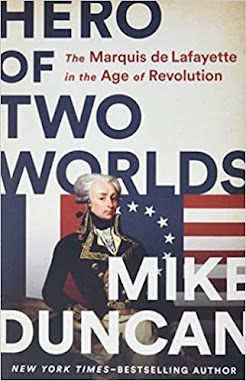Bookshot #163: Hero of Two Worlds
If I was being a good podcast listener, I would have purchased this book- but happily, I get a pass on
this one because I purchased Mike Duncan's first book (The Storm Before The Storm) and thus, don't feel too bad about using an Audible credit to download his latest- a biography of the Marquis de Lafayette, Hero of Two Worlds.
As always with audiobooks, I've got to touch on the narration- at least briefly: it's Mike Duncan. He did the History of Rome, and he's wrapping up Revolutions (both of which are must-listen podcasts even if you're not into history, the latter more so than the former, imo.) So this is a man who is practiced in the art of narration and he doesn't miss a beat with this book. If you like how he sounds on his podcast, you'll have no problems with his narration of the book.
This brings us to the book itself: I didn't know much about Lafayette going into this book- other than what I saw in Hamilton, if I'm being totally honest, but I did know who he was. He fought in the American Revolution, then returned to France and got caught up in that Revolution and everything that followed in its wake, but outside of that? Didn't really know much. (Fayetteville in North Carolina is apparently named after him, so TMYK, I guess?)
The scion of a wealthy land-owning family in Auvergne, Lafayette lost his father at an early age and was eventually moved to Paris to join his mother-- there, he was entered into the family's long tradition of military service and when the powerful Duc d'Ayen was looking to marry off one of his daughters, Lafayette was engaged to Adrienne- the match proved to be a good one, because two fell in love and were happy together from their time of marriage in 1774 to her death in 1807.
The political situation in Europe at the time was somewhat lacking in chances for military glory for a young man, but America was about to go into rebellion and Lafayette and other young officers wanted to get a chance for military glory fighting the British. The French government had no interest in provoking the British into at best a diplomatic incident or at worst, an out-and-out conflict, so they attempted to prevent these young men from going-- but Lafayette went anyway.
His reception was somewhat cold and standoffish at first. The Continental Army and the nascent American government were by that point heartily sick of French officers coming over with their 'experience' and 'demands for pay' that the Americans couldn't meet. Lafayette got their attention but not asking for much and reassuring them that he would do anything and make no demands, he eventually attracted the notice of George Washington and began to work his way up through the Continental Army and eventually played a crucial role at the siege of Yorktown which ended the American War for Independence.
He then returned to France just in time for their Revolution to begin. Lafayette eventually rose to the position of the commander-in-chief of the National Guard and helped to originate the French tricolor by proposing a cockade of red, white, and blue as a symbol of the guard. He was also a key player in drafting the Declaration of the Rights of Man and the Citizen. But as much as he tried to maintain law and order and advocate for the rule of law and basic liberty, he was eventually swept away in the rising tide of radicalism that turned into The Terror.
Eventually, Lafayette returned to his ancestral estates and tried to keep his head down as the Terror grew, but eventually, that was too much even for him and he tried to get out and for his troubles ended up in an Austrian prison. His son, Georges managed to flee to America. His wife, Adrienne, and his daughters were imprisoned in Paris, and through some frantic behind-the-scenes diplomacy on the part of the young United States, they managed to avoid the guillotine.
Reunited with his family and released from prison, he returned to France just in time for Napoleon's rise to power-- he refused to participate in Napoleon's government and became a liberal member of the Chamber of Deputies upon the Bourbon Restoration which he held for the rest of his life. He made a return visit to the United States in 1824, where he was feted as 'the nation's guest' and after one last revolution in July of 1830- where he declined an offer to become France's dictator. He died four years later, buried in Paris under soil from Bunker Hill- truly, the Hero of Two Worlds.
Overall: It is a fascinating portrait of a man so key to the history of two nations, if you wanted to know more about the Marquis de Lafayette, then this is the absolutely perfect book for you. Duncan seems preternaturally unable to construct a boring paragraph and he very much understands the assignment he's set himself. The result is a portrait of a man who believed in the principles of liberty and stuck by them consistently throughout his life. He was in favor of the abolition of slavery well before many of the Founding Fathers was-- and although his attempt at bringing abolition to France gradually was swept away in the return of autocratic rule under Napoleon, he never stopped believing it. An important figure, worthy of biography and one that more people should know more about. My Grade: **** out of ****



Comments
Post a Comment